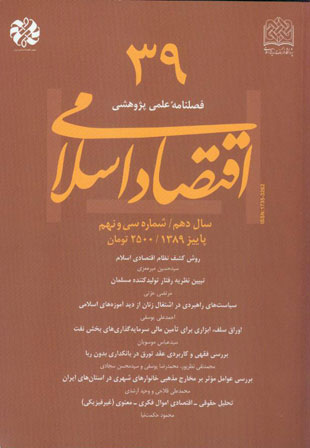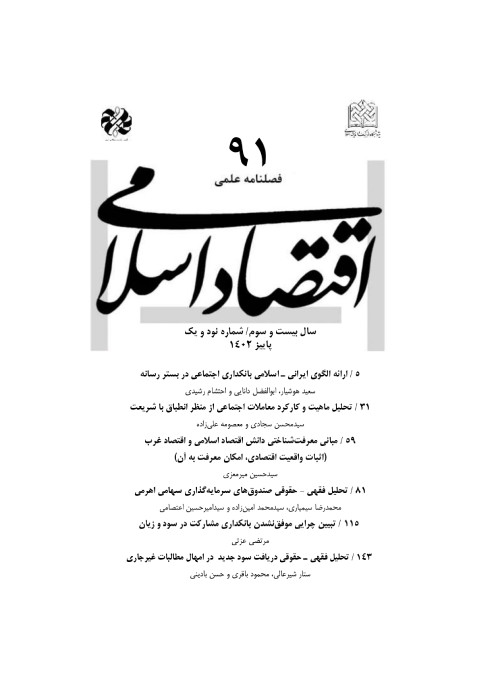فهرست مطالب

فصلنامه اقتصاد اسلامی
پیاپی 39 (پاییز 1389)
- 214 صفحه، بهای روی جلد: 25,000ريال
- تاریخ انتشار: 1389/08/17
- تعداد عناوین: 8
-
-
صفحه 5
-
صفحه 35
-
صفحه 197
-
Page 5Islamic Economic System is a collection of behavioral patterns and economic relations that exist in production, distribution and consumption sectors; inferred from [teachings of] the Holy Book (the Quran), traditions of the Holy Prophet (PBUH) and the Infallible Imams (AS) and rational arguments. The aforementioned patterns explain how the economic participators in the system are linked with each other and with the economic resources. They have been developed based on insight-based fundamentals and within Islamic economic ethical and legal frameworks, aiming to achieve [particular] economic goals of Islam. The current article aims to introduce a method of discovering the Islamic economic system and concludes that, in this venture i.e. inference of an Islamic economic system from Islamic sources, in the form of a desirable system of economy, one cannot confine to the prevalent component-oriented Ijtihad [the process of deducing religious laws from their sources]. Rather, in addition to that, it is necessary to use a systematic Ijtehad and benefit from the methods of studying economic systems in macro-economics, and perceive the Islamic economic system as a coherent whole, by expanding the realm of Ijtehad from subsidiary jurisprudential rules towards their goals, basis, relations and their insightful combination with the methods of studying the conomic systems in macroeconomics.Keywords: Method, Islamic economic system, Ijtehad, Macro, Economic Method
-
Page 35The motivation, goal and the nature of a Muslim producer's behavior is one of the most important theoretical challenges in Islamic economics. Though some theories do exist on this subject, they are not free from weaknesses. In the present article, by reviewing these theories and particularly focusing on the subjects of motivation, goal and models of optimization of Muslim producer's behavior, we attempt to provide a complementary explanation on the subject.This elaboration answers the query that; what is the motivation and goal of a Muslim producer and how is the equilibrium point determined? In the end, after explaining the motivation and goal of behaviors of a Muslim producer, we present a model of optimization of a Muslim producer's behavior.Keywords: Theory of Muslim producer's behavior, Motivation, Goal
-
Page 63With respect to women's employment, various views exist amongst experts of the fields of economics, social sciences, ethics and religion. Some, with their economic view point, support women's working outside the home premises.Others, like some Islamic thinkers, contrary to Islam's permission in this regard and practical examples supported by Islam in its early days, are against the idea of women working outside. It appears that with respect to women working and getting employed, if policies compatible with their natural, spiritual and physical creation are not considered, undeniable damages will be implicated upon the society and family.The present article with a descriptive-analytic method and benefiting from Islamic teachings, aims to discover the overall desirable strategic policies with an Islamic approach for women's mployment. Considering such strategic policies,women's occupation outside their homes will either not hurt the society, upbringing of children, family etc. at all, or the damages will drop to the least.Keywords: Women's employment, Appropriate policies, Natural, Innate Properties, Peculiarities
-
Page 85Economic development and growth of any country is based upon targeted and managed investment. In Iran, one of the most important economic sectors is the Oil Industry which continuously needs fundamental investments in order to continue its activities in accordance with national and international economic conditions. It is clear that every investment needs financial arrangements through appropriate instruments. For this purpose, with approval of the fifth development plan, the Oil Ministry was permitted to issue Sukuks for arranging investments for the industry. Financial studies [performed] with the aim to select the Sukuk most appropriate to arrange finance for the oil sector for investments, specially for operational activities of fields common between oil and gas, put forward a range of various types of Islamic financial instruments (Sukuk) such as:Participatory papers, Istisna' papers, Salaf papers and Rental papers, which may be used to arrange finance for such projects.In the current article, using the librarian sources and with a descriptiveanalytic method, we want to prove this assumption that; based on combined contracts of standard parallel Salaf and hawalah (transference contract), a legal instrument with a controlled efficiency risk can be drafted, under the title of Salaf papers. The results of this research show that this instrument may have varying uses, one of which being financial arrangement for the overhead oil sector projects.Keywords: Financial instruments, Salaf papers, Standard parallel Salaf, Hawalah, Buying Option (Call Option), Selling Option (Put Option)
-
Page 117
Liquidity is one of the most serious needs of economic participators in the world today. In interest-free banking laws this need has been fulfilled throughQardhul-Hasanah, discounting of bills and Salaf contracts. Each one of these contracts has its own limitations, which have been brought under discussion.Tawarruq contract, with its own peculiarities, such as making the free sources available for the customers, can become a subject of attention for the banks and economic firms. Tawarruq is a contract which consists of two sales: one credit and the other cash, and its goal is to arrange liquidity. For some period the mentioned contract is being used in Arabic banks and has become popular among banks and their customers. However, it has also attracted many discussions within Sunni blocks with respect to its jurisprudential and economic aspects.The present article strives to perform a jurisprudential and bankingefficiency study of tawarruq contracts in interest-free banking, based on Shiite jurisprudence. The research method has been library oriented, based on analysis of written works. Assumption of the article is that, first: the tawarruq contract is permissible in Shiite fiqh; second: tawarrruq is one of the banking contractsaiming liquidity for the bank and the customers. Similarly while comparing it with other interest-free banking contracts, we concluded that tawarruq can play a complementary role for Murabaha and Installment sales contracts.
Keywords: Tawarruq, Interest, free banking, Discounting of bills, Installment sales, Qardh, ul, Hasanah -
Page 145One of the portions of expenditures of people living in Muslim countries is religious expenditures. Such a behavior is undertaken with the aim of attracting God's pleasure or in order to gain Divine rewards. It is important to study such economic behavior of a Muslim society and the factors that influence it, from various aspects such as; economic, social and cultural.In this paper, we have evaluated the influence of real incomes of urban households as an economic factor, influence of inflation and unemployment rates, as socio-economic factors and influence of change in the attitude of executive managers [of the society] towards promoting religious expenditures through slogans, as a cultural factor. Effects of the mentioned variables over religious expenditures in 28 provinces of Iran were evaluated with the use of income-expenditure data of the households available with the Iranian Centre of Statistics, for the period of 1376 - 1387 (1997-2008) and through a panel data approach.Results of this study, based on the random effects model, indicate that real income of urban households and the change in attitude of executive managers towards promoting such expenditures have a positive effect on religious expenditures and are statistically significant. Unemployment and inflation have a predictable negative effect, but are not statistically significant.Keywords: Religious expenditures, Panel data model, Urban households, Provinces, Iran
-
Page 167One of the areas, which has seriously changed is the area of Property and Economic Laws and one of the reasons of this rapid change is the transformation of knowledge and technology in the present era. If in an age, researchers were honored due to their social status, today besides that, with the in many cases; in support of their intellectual findings their respect has taken an conomic aspect to itself. It was when, along with industrial development, mechanically copying intellectual products,works and achievements and economically benefitting from them became a possibility, that people became attracted towards it. Such situation caused the investment and expenditure for innovation and new, heavy and abundant industries, to expand.In Islamic studies, such new properties, which are known as nonphysical or intellectual property, have been less researched. In more exact terms, although some of these properties specifically and individually have been discussed and in Islamic jurisprudential system and with respect to them, religious opinions do exist, but such properties have not been studied systematically and collectively.The current article strives that, along with mentioning some important examples, make all of those a subject of study as intellectual property with an artificial nature as a product. In addition in order to specify its status in the system of property [or wealth], besides a deep study of its origin, the subject has been studied negatively and positively. Moreover,in order to closely understand such properties, it is necessary to have knowledge about their peculiarities. Presenting a clear definition of such properties, expressing their peculiarities and religious and legal rules with respect to them will have an important effect on expansion of their legal and economic functioning and interactions of economic-related individuals and institutes, specially financial and monetary.Keywords: Intellectual Property, Goodwill, Business, Professional right


